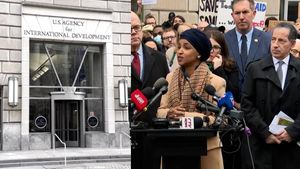On February 1, 2025, the Sudzha school-internate, located in the Kursk region of Russia, became the shocking focal point of yet another episode in the protracted conflict between Russia and Ukraine. A missile strike targeted the facility, which, according to reports, housed civilians preparing for evacuation, including vulnerable populations such as women and the elderly. This incident has ignited fierce recriminations from both Moscow and Kyiv, deepening the divide and highlighting the tragic human cost of war.
According to the Russian Ministry of Defense, the Ukrainian Armed Forces (UAF) executed what they termed as "a targeted missile attack," contravening international law by intentionally aiming at civilians. They stated, "On February 1, the armed forces of Ukraine committed yet another military crime, launching a targeted missile attack on the internat in the city of Sudzha..." This assertion has been met with skepticism internationally, as the everyday realities of the conflict raise numerous questions.
The Russian narrative is vehemently supported by local authorities. Alexander Khinshtein, the acting governor of the Kursk region, described the attack as "inhumane atrocities of the Kyiv regime," reflecting the increasingly hostile rhetoric aimed at the Ukrainian government. Russian officials have painted the UAF's actions as terrorism, with Maria Zakharova, the official representative of the Russian Foreign Ministry, accusing the Ukrainian forces: "The deliberate attack on the internat with civilians points to the cruelty of the Kyiv regime..."
Contrarily, Ukrainian sources argue the legitimacy of their military operations. They contend the Russian forces used guided bombs, deliberately creating chaos amid civilian populations to shift blame afterward. Ukrainian military command accused Russia of remaining fully aware of the civilian presence due to their preparations for evacuation.
Following the strike, it was reported by Alexey Dmitrashkovsky, spokesperson for the temporary military commandant, "We managed to save 84 civilians..." Yet, the situation was far from simple. Rahul’s comments highlighted the immense challenges faced by the rescuers, who were initially hindered by subsequent bombardments aimed at the same location. Reports detail the strike resulting in at least four confirmed deaths amid the rubble.
The events at the Sudzha school-internate did not occur in isolation. Similar tragedies have plagued the region throughout the conflict, with collateral damage increasingly claiming innocent lives. The impact extends beyond the immediate fatalities or injuries; they resonate through families and communities, leaving indelible scars.
International organizations, including the United Nations, are now being called upon for intervention and accountability. The gravity of the situation has prompted individuals like Rodion Miroshnick, Russian special envoy, to assert: "Intentionally targeting civilians is terrorism..." This perspective invites calls for greater scrutiny over the humanitarian impact of military actions taken by both sides.
Humanitarian agencies have expressed grave concern over civilian safety during conflicts. Such incidents often provoke discussions about war crimes and the responsibilities of state actors under international law, especially when strikes target known civilian sites like the Sudzha school-internate, which, before the incident, displayed the word "PEOPLE" prominently—indicating the civilians inside.
The Russian leadership's response indicates they may utilize the tragedy as propaganda, referencing casualties to bolster their stance internationally. Observers have noted the historical undercurrents here, reminiscent of attacks during the early phases of the war, where similar civilian-focused strikes generated global outrage and scrutiny.
Despite the tragic loss of lives and the immense suffering of families involved, narratives from both sides continue to intertwine with national pride and geopolitical strategy. The incident at Sudzha serves not only as another painful reminder of the costs of war but also as evidence of the critically contested narratives shaping perceptions of right and wrong within the conflict. How will the world respond to this latest atrocity, and will accountability prevail amid the fog of war? This remains to be seen as the debate rages on.
With mounting civilian casualties and persistent violent clashes, the international community grapples with how to approach the situation, striving for peace amid pervasive chaos.



